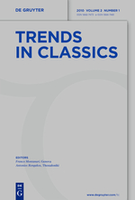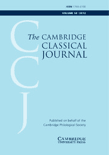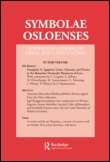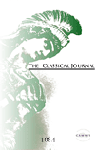
Trends in Classics
Scope & Guideline
Connecting scholars to the rich tapestry of classical studies.
Introduction
Aims and Scopes
- Classical Literature Analysis:
The journal emphasizes critical examinations of classical texts, including poetry, drama, and historical narratives, often exploring themes such as authorship, genre, and intertextuality. - Cultural and Historical Contexts:
Research often situates classical works within their socio-historical frameworks, analyzing how cultural dynamics influence literary production and reception. - Papyrology and Manuscript Studies:
A significant focus on papyrology highlights the recovery, interpretation, and contextualization of ancient manuscripts, contributing to our understanding of ancient literacy and textual transmission. - Lexicography and Language Studies:
The journal includes studies on ancient languages and lexicography, examining the evolution of language in classical texts and its implications for understanding meaning and context. - Reception Studies:
The exploration of classical texts in later cultures and their impact on contemporary thought is a recurring theme, often analyzed through memory studies and cultural theory. - Interdisciplinary Approaches:
The journal promotes interdisciplinary methodologies, integrating insights from fields such as archaeology, anthropology, and cognitive science to enrich classical scholarship.
Trending and Emerging
- Memory Studies in Classical Reception:
The integration of memory studies into classical reception theory has gained traction, allowing scholars to explore how ancient texts influence modern cultural identities and collective memory. - Intertextuality and Influence:
The focus on intertextual relationships between classical texts and later works has surged, with scholars analyzing how classical themes are reinterpreted across genres and time periods. - Digital Humanities Applications:
There is a growing interest in utilizing digital tools and methodologies to analyze classical texts, enhancing accessibility and fostering new forms of scholarly interaction with ancient materials. - Cognitive Approaches to Literature:
Emerging cognitive approaches that consider how ancient literature engages with human cognition and perception are increasingly prominent, offering fresh insights into literary analysis. - Health, Healing, and Ancient Medicine:
Research examining concepts of health and healing in ancient texts has become more prevalent, particularly in the context of Greco-Roman medical practices and their cultural implications.
Declining or Waning
- Traditional Historical Narratives:
There appears to be a decreasing focus on purely historical accounts of ancient events, as more scholars opt for theoretical and interdisciplinary approaches that challenge conventional narratives. - Mythological Studies:
Research centered solely on mythological interpretations of classical texts is less prevalent, with scholars increasingly integrating myth within broader cultural and psychological frameworks. - Roman Comedy Analysis:
While still present, the specific analysis of Roman comedic texts has seen reduced prominence, as the journal shifts towards more innovative and varied interpretations of genre. - Classical Philosophy:
Studies dedicated to classical philosophical texts, particularly those focused on isolated philosophical doctrines, have become less common, as the field moves towards integrative approaches that consider philosophy within broader literary and cultural contexts. - Localized Archaeological Studies:
Research that focuses narrowly on specific archaeological sites without broader implications for classical studies is waning, as the journal encourages more comprehensive analyses that connect local findings to wider historical narratives.
Similar Journals

Eirene-Studia Graeca et Latina
Unveiling the Depths of Linguistic HeritageEirene-Studia Graeca et Latina, ISSN 0046-1628, is a prominent academic journal published by the Institute of Classical Studies, Academy of Sciences of the Czech Republic. Focusing on the fields of Classics, Linguistics, and Archaeology, this journal serves as a vital platform for scholarly discourse and research dissemination since its inception in 2002. Although it operates under a traditional access model, the journal has established itself within the academic community, evidenced by its placement in the Q4 category across multiple disciplines in 2023. This includes significant rankings in areas such as Archaeology and Language and Linguistics, where it finds itself within the 27th to 16th percentiles of its respective categories. Eirene aims to foster the advancement of research in the Humanities, providing a rigorous forum for scholars and practitioners interested in classical studies. Its contribution to the academic landscape is essential for those who aspire to explore the depths of ancient languages, cultures, and methodologies, making it a valuable resource for researchers, professionals, and students alike.

Cambridge Classical Journal
Fostering Dialogue Across the Classical SpectrumThe Cambridge Classical Journal, published by Cambridge University Press, is a prestigious academic journal that has been a cornerstone of classical scholarship since its inception in 1884. With a focus on advancing knowledge in the fields of Classics, Linguistics, and Literature and Literary Theory, the journal operates with an annual publication cycle, showcasing cutting-edge research that contributes significantly to these disciplines. With a commendable impact factor and ranking in the top quartile (Q1) for Classics and Q2 for Literature and Literary Theory as of 2023, it remains an essential resource for scholars, students, and professionals alike. The journal's commitment to excellence is evident in its rigorous peer-review process and its role in fostering scholarly dialogue on classical texts and their linguistic and cultural implications. While the Cambridge Classical Journal is not an open-access publication, it is invaluable for anyone seeking to deepen their understanding of the classical world and its enduring influence on contemporary thought.

Synthesis-La Plata
Exploring the intersections of Literature and Linguistics.Synthesis-La Plata is an esteemed academic journal published by UNIV NAC LA PLATA, FAC HUMANIDADES & CIENCIAS EDUC, focusing on the fields of Arts, Humanities, and Social Sciences, with a particular emphasis on Literature, Literary Theory, and Linguistics. Since its inception in 2009, this Open Access journal has been dedicated to providing a platform for scholarly discourse and innovative research, allowing unrestricted access to a multitude of international studies. Although it experienced a hiatus in its Scopus coverage between 2012 and 2014, the journal continues to foster critical analysis and promotes interdisciplinary approaches within its domains. With an ISSN of 0328-1205 and an E-ISSN of 1851-779X, Synthesis-La Plata aims to reach a diverse readership, including researchers, educators, and students who seek to deepen their understanding of literary and linguistic dynamics. Despite its recent Scopus rankings indicating low percentiles, the journal remains a significant resource for scholarly inquiry in the humanities."

AMERICAN JOURNAL OF PHILOLOGY
Unveiling New Perspectives in Philological ResearchThe American Journal of Philology is a premier scholarly publication dedicated to the field of classics, literature, cultural studies, and linguistics. Published by Johns Hopkins University Press, this esteemed journal boasts an impressive reputation, reflected in its high impact factor and robust rankings—achieving a prestigious Q1 classification in Classics and Literary Theory, while securing a Q2 in Cultural Studies and Linguistics for 2023. The journal provides a rigorous platform for original research, critical essays, and innovative inquiries, contributing significantly to contemporary discourse in the humanities. Its comprehensive scope encompasses interdisciplinary studies, making it a vital resource for researchers, professionals, and students alike. Although it does not operate under an open-access model, the journal ensures that its content remains accessible to a wide audience through institutional subscriptions. With a publication history dating from 1972 to the present, the American Journal of Philology continues to be pivotal in fostering academic excellence and enriching the understanding of philological studies.

Symbolae Osloenses
Navigating the Nuances of Classical HeritageSymbolae Osloenses, published by TAYLOR & FRANCIS LTD, is a distinguished journal in the field of Classics, with a rich history dating back to its inception in 1922. This UK-based journal has continuously contributed to the scholarly discourse surrounding ancient cultures, languages, and literature, making it a crucial resource for researchers, educators, and students alike. Though it operates under a subscription model, its impact on the academic community is underscored by its recent inclusion in the 2023 Scopus rankings, where it holds a respectable position in the 65th percentile among its peers. With decades of published research spanning from 1924 to 2023, Symbolae Osloenses remains committed to fostering robust academic dialogue and advancing knowledge in the Classics, catering to a diverse readership seeking to explore the nuances of classical studies.

PHOENIX-THE JOURNAL OF THE CLASSICAL ASSOCIATION OF CANADA
Unveiling the Legacy of Classical ThoughtPHOENIX - THE JOURNAL OF THE CLASSICAL ASSOCIATION OF CANADA is a distinguished academic journal published by the Classical Association of Canada, dedicated to advancing the study of classical antiquity and its enduring influence on contemporary society. With an ISSN of 0031-8299 and an E-ISSN of 1929-4883, PHOENIX serves as a pivotal platform for researchers, educators, and students in the field of classics. Although without open access provisions, the journal is noted for its rigorous peer-review process, ensuring the publication of high-quality scholarship that meets the academic community's standards. With its back issues archived since 2002, the journal is supported by a strong reputation, evidenced by its Scopus ranking in the 80th percentile in the Arts and Humanities - Classics category. Based in Toronto, Ontario, it continues to foster scholarly dialogue and exploration of themes ranging from ancient texts to contemporary interpretations of classical traditions. By prioritizing diverse contributions that enhance our understanding of classical studies, PHOENIX remains a vital resource for anyone engaged in the rich and varied exploration of the ancient world.

Cahiers des Etudes Anciennes
Illuminating the Legacy of Ancient CulturesCahiers des Etudes Anciennes is a distinguished scholarly journal dedicated to the field of Classics, published by Université du Québec à Trois-Rivières. With its ISSN 0317-5065 and E-ISSN 1923-2713, this journal has been a vital platform for the dissemination of research since its inception in 1976, achieving Open Access status in 2006 to enhance accessibility and encourage wider readership. Operating from Canada, specifically Trois-Rivières, Quebec, this journal has cultivated an academic environment that fosters critical dialogue among classics scholars. With a Scopus ranking of 94 out of 170 in the Arts and Humanities - Classics category, placing it in the 45th percentile, it currently holds a Q3 quartile ranking, highlighting its growing influence in the academic community. Cahiers des Etudes Anciennes aims to publish high-quality research articles, reviews, and essays that contribute to the understanding of ancient civilizations, texts, and cultures, making it an invaluable resource for researchers, professionals, and students alike looking to explore the depths of classical studies.

CLASSICAL JOURNAL
Cultivating Knowledge of the Classical WorldCLASSICAL JOURNAL, published by the esteemed Johns Hopkins University Press, stands as a premier academic platform dedicated to the exploration and analysis of classical studies, focusing on ancient Greek and Roman literature, history, and culture. With an impressive impact factor and categorized in the Q1 quartile for Classics in 2023, the journal provides high-quality, peer-reviewed articles that contribute significantly to our understanding of classical antiquity. Researchers and students from around the globe turn to CLASSICAL JOURNAL for groundbreaking insights, as it consistently ranks in the top tier of its field, occupying rank #52 in the Scopus listings within the Arts and Humanities sector, placing it in the 69th percentile. While the journal maintains a traditional subscription model, its rich content and scholarly relevance make it an essential resource for anyone engaged in the study of the classical world, enhancing the academic discourse surrounding this timeless and influential area of study.

GYMNASIUM
Reviving Ancient Wisdom for Modern LearningGYMNASIUM, published by Universitätsverlag C Winter Heidelberg GmbH, is an academic journal dedicated to the fields of Classics and Education. Since its inception in 1970, the journal has served as a platform for scholarly discourse, focusing on the intersection of classical studies and educational methodologies. Despite its discontinuation from Scopus coverage post-2021, GYMNASIUM remains an important resource for researchers, professionals, and students, fostering a deeper understanding of ancient texts and their relevance in contemporary educational frameworks. Current rankings place the journal in the Q4 quartile in both Classics and Education categories, reflecting its niche yet significant contribution to these fields. Researchers can access the journal's past issues through various academic libraries in Germany, enhancing interdisciplinary study and promoting scholarship across broader educational horizons.

Exemplaria Classica
Fostering Insight in Classics and Literary DiscourseExemplaria Classica, published by Universidad de Huelva's Servicio de Publicaciones, is a prominent academic journal dedicated to the fields of Classics and Literature and Literary Theory. Established in 2011, this journal serves as a vital resource for scholars, educators, and students interested in the rich tapestry of classical literature and its enduring influence on contemporary thought. With an ISSN of 1699-3225 and an E-ISSN of 2173-6839, it has firmly established itself in the academic community, although it currently holds a Q4 ranking in both its categories. The journal is ranked #712 out of 1106 in Literature and Literary Theory and #129 out of 170 in Classics as per Scopus rankings, reflecting its emerging status in these fields. Despite its open access designation being currently unclear, Exemplaria Classica is essential for advancing discussions and research in classical studies and has covered a diverse range of topics over its publishing years, making it an important addition to any academic library.